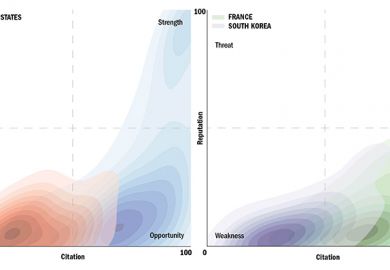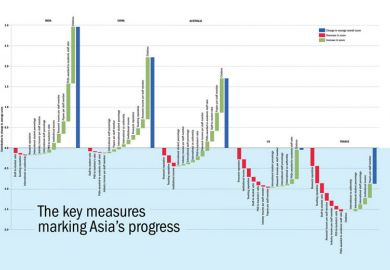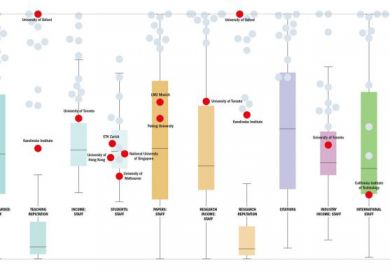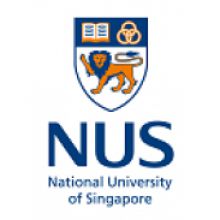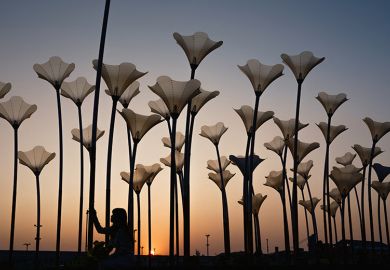Browse the full results of the World University Rankings 2018
My wife has always been a very skilled photographer, whereas I am a very poor one. Yet today, my photos are often better than hers. The reason is simple – I invested in a much fancier camera.
Technology is levelling up the capabilities of ordinary people like me, enabling us to do things that we could not have easily done before. This phenomenon is occurring across many fields, not just in specialised ones such as robotic surgery. In addition, advances in artificial intelligence are starting to impact areas involving complex cognitive tasks and skills.
Technology and innovative business and financing practices have also created a new environment with new opportunities for individuals and small start-ups to commercialise novel ideas, and in some cases to grow rapidly to regional or global scale.
In other words, we are now in a new age of empowerment. This offers some wonderful advances and exciting opportunities, but at the same time, competition will further intensify, and the implications of this change will be profound.
A central issue is how technology and artificial intelligence will transform the nature of work. Public discussions have also raised concerns about how many people might find themselves displaced from their existing jobs by robots and smart software.
Issues raised by the age of empowerment will cut to the very core of higher education, impinging on areas that are central to our missions and functions. Wrestling with how best to meet these challenges, my colleagues and I at the National University of Singapore have endeavoured to address two key questions:
- What changes are needed to educate truly future-ready graduates?
- How should we reposition the NUS for the future?
To thrive and take advantage of the opportunities that lie ahead, qualities such as imagination, curiosity, strong interpersonal skills and entrepreneurial spirit will become even more critical.
Over the past five years, our provost, Tan Eng Chye, who will take over as president of NUS in January 2018, has conceptualised and led the transformation of undergraduate education at the NUS. This approach, which we express using the acronym “AGILE”, encompasses how we aim to nurture future-ready graduates.
The AGILE approach
Academic
A key goal is to enhance our students’ ability to “zoom out and zoom in”, to be able to see the bigger picture and the connections between disparate issues while also possessing the capacity to go into depth in specific areas. To achieve this, we have revamped our broad-based education. One example is the strengthened emphasis on quantitative reasoning for nearly all undergraduates as part of general education. At the same time, we are creating curricular space to allow more students who wish to complete two majors to do this as part of their degree programme.
Global and experiential
Our objective is to increase cross-cultural effectiveness and to create diverse, significantly scaled programmes that help to foster leadership, teamwork and interpersonal skills through experiential learning. Today, more than 80 per cent of NUS undergraduates have an overseas educational experience, and our residential college learning model covers more than 50 per cent of each freshman cohort.
Industry-relevant
This is not a shift towards more vocationally directed education. Instead, it is a recognition that extending learning into different settings and contexts – including work-related ones and opportunities to “learn by doing” – can create powerful ways to promote qualities such as creativity, problem-solving and teamwork.
Lifelong learning
The NUS has set up an institute for the Application of Learning Sciences and Educational Technology (ALSET), which researches learning in the Singapore and Asian context and encourages faculty to adopt pedagogical approaches that work well for our students. ALSET is also developing new courses on learning how to learn and on asking questions. In addition, the NUS established a School of Continuing and Lifelong Education in 2015, which coordinates and drives a major effort to embed lifelong education across the university.
Entrepreneurship
The NUS has a unique and very successful experiential entrepreneurship educational programme in which undergraduates spend up to a year in internship in key “technopreneurial” hubs around the world, such as Silicon Valley, Shanghai and Israel, while taking courses at local partner universities. The number of students in this NUS Overseas Colleges programme has increased significantly, and we are extending it to postgraduates and postdoctoral fellows. In parallel, the NUS has enhanced support for all students who are interested in pursuing entrepreneurial activities and creating start‑ups.
Repositioning for the future
To position ourselves strategically for the age of empowerment, the university’s vision is to be a community and a place where the future is formed, and where young people are inspired and equipped to help shape that future.
Among other things, this involves three key thrusts.
First, we will continue to build world-class research strengths and to actively promote the translation of research for economic, health and societal benefit. For example, Ho Teck Hua, our deputy president (research and technology), has established world-class research programmes in data science, operations research and analytics, cybersecurity, artificial intelligence and the understanding of risk, and is housing all these in a single building together with domain experts in “application verticals” such as transport and health. This dense clustering of researchers, students, industry partners, start-ups and government agencies will create a unique and dynamic environment that promotes imaginative approaches to tackling large, complex challenges.
A second critical area is to help students foster a positive growth mindset. The NUS has developed a unique Roots and Wings programme that aids students with self-discovery and the development of a mindset that looks positively to the opportunities of the future.
Download a copy of the World University Rankings 2018 digital supplement
Third, the university recognises that it cannot focus solely on those who stand to gain from the age of empowerment, and must also contribute to addressing the issues concerning all those who may be adversely affected by any disruptive upheavals. These include the ethical, social, legal and policy impacts of technology on different levels of society.
The approaches and responses of universities to the age of empowerment will and should differ, reflecting the varying environments and contexts in which institutions operate and the myriad goals they pursue. Nevertheless, I believe that the two key questions that have engaged our minds at the NUS are vital ones, and ones worthy of consideration well into the future.
Tan Chorh-Chuan is the president of the National University of Singapore.
The National University of Singapore will host the Times Higher Education World Academic Summit 2018, which will take place from 25 to 27 September 2018. Register here.
Register to continue
Why register?
- Registration is free and only takes a moment
- Once registered, you can read 3 articles a month
- Sign up for our newsletter
Subscribe
Or subscribe for unlimited access to:
- Unlimited access to news, views, insights & reviews
- Digital editions
- Digital access to THE’s university and college rankings analysis
Already registered or a current subscriber?


